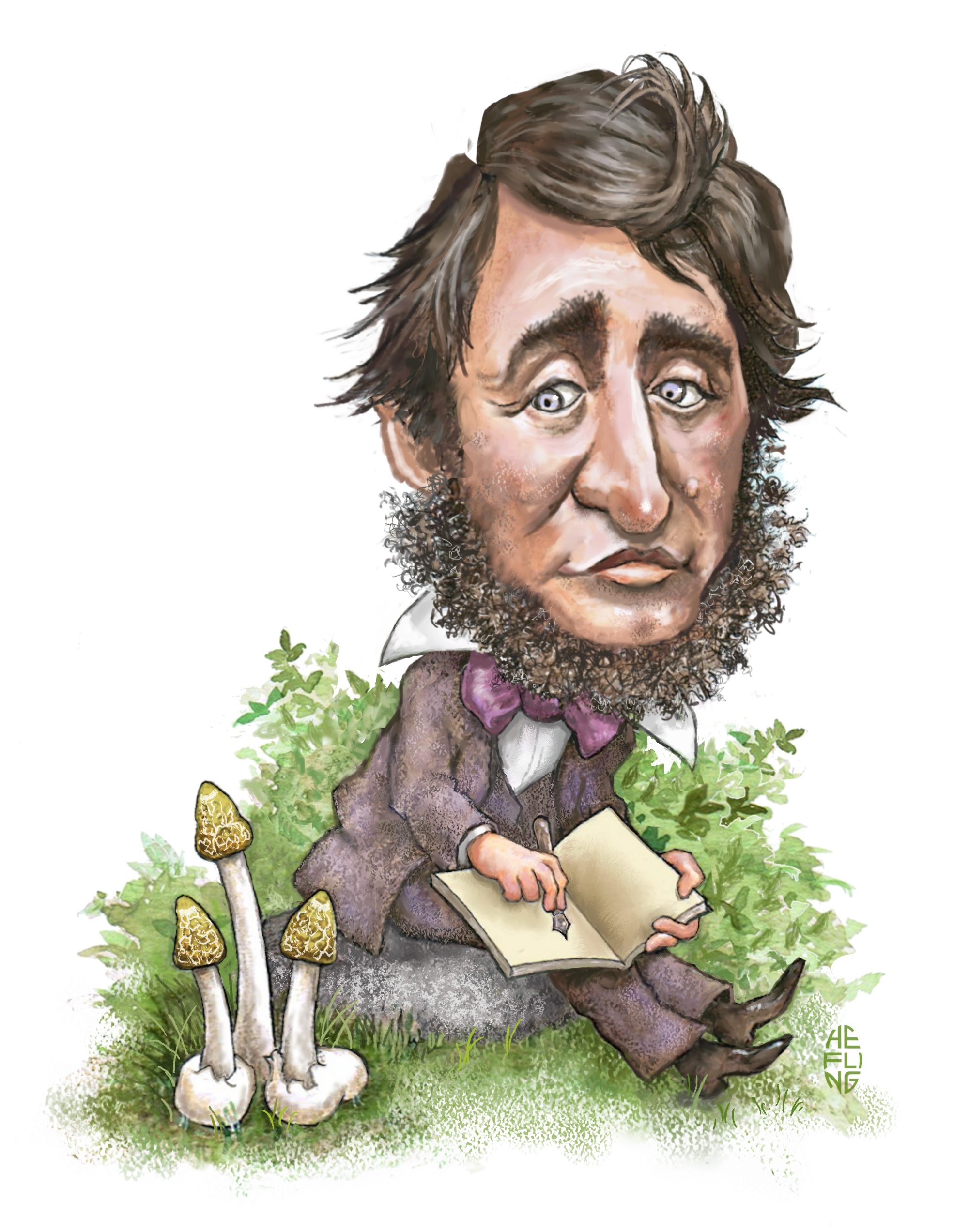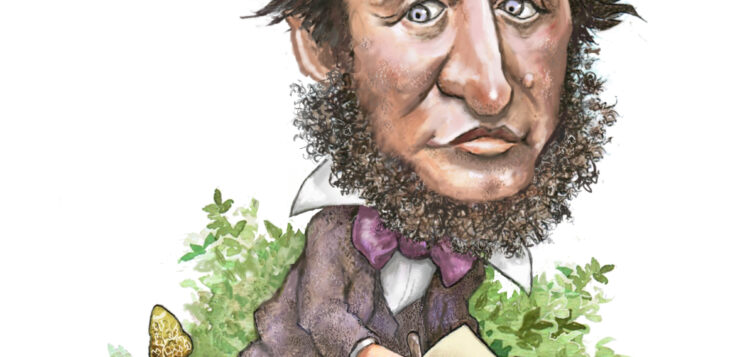RALPH WALDO EMERSON’S 1841 essay “Self-Reliance” contains one of the most stirring coming-out challenges ever written. This is not the traditonal reading of the great American essay, to be sure, but I believe that “Self-Reliance” must be understood in the context of Emerson’s awareness of unconventional sexual desire, bolstered by his intimate friendship with Henry David Thoreau.
Emerson was born in Boston in 1803 and died in Concord, Massachusetts, in 1882. “Waldo” was ordained as a Unitarian minister in 1829, and the response to his eloquence and personal charm promised job security. But secretly, Emerson was experiencing a crisis of faith, and his sermons minimized doctrine to focus on personal spiritual experience, arguing that each seeker’s unique encounter with a universal moral law was what really mattered. His first book, Nature, appeared in 1836, and in 1841 and 1842, he published Essays: First Series and Essays: Second Series. The First Series includes his most important essay, “Self-Reliance.”
“Love Me for What I Am”
Transcendentalism, the philosophical movement that Emerson did so much to develop and promote, captured the attention not only of theologians and thinkers but also of the general public, largely because it provided people with pragmatic guidance for “the conduct of life.” “Self-Reliance” brilliantly explores this theme: “Trust  thyself: every heart vibrates to that iron string. … Nothing is at last sacred but the integrity of your own mind.” Everyone agrees that “Self-Reliance” is an indictment of mindless conformity and a challenge to think for oneself. But it has rarely been recognized as one of history’s first manifestos for people to be honest about their sexual nonconformity. To quote a key passage at length:
thyself: every heart vibrates to that iron string. … Nothing is at last sacred but the integrity of your own mind.” Everyone agrees that “Self-Reliance” is an indictment of mindless conformity and a challenge to think for oneself. But it has rarely been recognized as one of history’s first manifestos for people to be honest about their sexual nonconformity. To quote a key passage at length:
Live no longer to the expectation of these deceived and deceiving people with whom we converse. Say to them, “O father, O mother, O wife, O brother, O friend, I have lived with you after appearances hitherto. Henceforward I am the truth’s. … I shall endeavour to nourish my parents, to support my family, to be the chaste husband of one wife,—but these relations I must fill after a new and unprecedented way. I appeal from your customs. I must be myself. I cannot break myself any longer for you, or you. If you can love me for what I am, we shall be the happier. If you cannot, I will still seek to deserve that you should. I will not hide my tastes or aversions. …
If you are true, but not in the same truth with me, cleave to your companions; I will seek my own. I do this not selfishly, but humbly and truly. It is alike your interest, and mine, and all men’s, however long we have dwelt in lies, to live in truth. Does this sound harsh to-day? You will soon love what is dictated by your nature as well as mine, and, if we follow the truth, it will bring us out safe at last.
Hiding in plain sight since 1841, this mandate to be true to oneself may speak forcefully to contemporary LGBT people who have had the experience of coming out as gay. On the other hand, the speaker swears to remain “the chaste husband of one wife.” Emerson was married and sworn to fidelity to his (second) wife. However, it seems quite likely that his first marriage—to a beautiful woman who was dying of tuberculosis—involved tender affection but not sexual relations. His second marriage produced four children. By 1833, Emerson seems to have calculated that he was overdue for another marriage, and he found a relatively wealthy 31-year-old woman named Lydia Jackson. Emerson’s decidedly bloodless, businesslike marriage proposal, coming in January of 1835, defined the terms of their union: he would treat her with “deep and tender respect,” since her “earnest and noble mind” inspired so much goodness in his soul. Nevertheless, he dampened any romantic expectations by assuring her that his love could only manifest itself in a “new and higher way.” He declared that she was “so in love with what I love” that “no remoteness of condition could separate us”—perhaps a veiled reference to his nontraditional sexual orientation. His essay “Spiritual Laws” declared that the soul harbors a “photometer,” a metaphorical “irritable goldleaf and tinfoil” device for measuring light. According to Louisa May Alcott, he “defended his lack of affectionate gestures to [Lydia] by saying he was a ‘photometer’ not a stove: he could measure light but not radiate heat.” Emerson’s own brush with a same-sex love affair was first proposed in 1976 when Jonathan Ned Katz published his groundbreaking Gay American History. Emerson’s baffling, paralyzing crush on Harvard classmate Martin Gay is fairly well documented by Katz and his successors. However, the field of Transcendentalist studies has largely chosen to trivialize its implications—when it hasn’t avoided them entirely. This tendency is nowhere more apparent than in Emerson’s relationship with Henry David Thoreau.
After a long history of denial by academic historians and critics, Thoreau’s sexual nonconformity is a matter of widespread agreement, if not consensus. However, no one has gone so far as to suggest that he was Emerson’s lover. Emerson’s account of how they first met has a starry-eyed quality: “He was not quite out of college … when I first saw him.” Emerson helped examine Thoreau for a Harvard rhetoric class on February 25, 1835, which was one month after his marriage proposal to Lydia Jackson. Thoreau, who was fourteen years younger than Emerson, graduated in 1837—a few months after the publication of Emerson’s first book, Nature. Thoreau’s Harvard classmate David Greene Haskins found it “remarkable” to see how Thoreau had so quickly undergone a “chemical” transformation into Emerson’s doppelgänger, “due to his frequent contacts and intimate intercourse with Mr. Emerson, beginning from the very time of his leaving college.” In Thoreau’s mannerisms, said Haskins, and in “the tones and inflexions of his voice, in his modes of expression, even in the hesitations and pauses of his speech, he had become the counterpart of Mr. Emerson.” Haskins swore that he could have recognized Thoreau’s original voice in the dark, but in Emerson’s study, he decided to deliberately close his eyes while they conversed and found himself “unable to determine with certainty which was speaking.” The future poet James Russell Lowell was “exquisitely amused” by the results of the same experiment. Biographers have always expected readers to shut their eyes to the remarkable contrast between Emerson’s delight in finding Thoreau and his fussy remarks about the women in his life. In April 1838, with Thoreau by his side, his familiar surroundings suddenly acquired a novel and compelling salience: the valley forming a “great mountain amphitheatre” that echoed “with gladness” to the voices of crows and piping frogs. The valley now made “worlds enough for us.” When he ventured out of doors to view the first glimmering star, the piping of a frog seemed to challenge him: “Well do not these suffice? Here is a new scene, a new experience. Ponder it, Emerson.” Thoreau responded in the same month with a poem about his “Friendship” with Emerson. Although their “Love cannot speak,” the rhapsody acknowledges their “kindred shape” and similar “loves and hates”—especially their “kindred nature,” which proclaims them to be “mates,/ Exposed to equal fates,/ Eternally.” The poem marks them as two stalwart oak trees who could, with pride, withstand any storm. The secret to their survival was to “barely touch” above ground, while “Down to their deepest source … [t]heir roots are intertwined.” A year later, Thoreau handed Emerson his poem “Sympathy,” dedicated to “a gentle boy,” the preadolescent Edmund Sewell. It was premised upon the dicey notion that “I might have loved him,/ Had I loved him less.” Emerson called it “The purest strain, and the loftiest, I think, that has yet pealed from this unpoetic American forest.” On the other hand, one finds it difficult to gloss over the physicality of another Thoreau poem, which begins: “I was made erect and lone,/ And within me is the bone.” During two prolonged periods between 1841 and 1848, Thoreau lived in Emerson’s house. On April 26, 1841, he moved into the “prophet’s chamber” at the head of Emerson’s stairs and began a phase of his life that included fawning over Lydia via unctuous notes, doing the family’s gardening, and repairing anything that broke. He delighted in Emerson’s children, becoming a second father to them. In November 1847, when Emerson was away in Europe and Thoreau was acting head of the household, little Eddy asked him pointedly: “Mr. Thoreau, will you be my father?” By June 1841, Emerson was seeing in Thoreau a “wood god,” probably a reference to Pan. Presumably the legs that Emerson called “strong” were as hirsute as his arms, further cementing his association with a satyr. Thoreau himself delighted in the comparison: “Perhaps of all the gods of New England and of ancient Greece, I am most constant at [Pan’s] shrine.” Being Thoreau, however, meant also being deeply conflicted about its sexual connotations. In the “Higher Laws” chapter of Walden, he acknowledged his fear that humans are “such gods or demigods only as fauns and satyrs, the divine allied to beasts, the creatures of appetite, and that, to some extent our very life is our disgrace.” He could not speak about purity, he said, “without betraying my impurity.” Shape-shifting into a “good river-god,” “my valiant Henry” introduced Emerson to “the riches of his shadowy starlit, moonlit stream.” This “lovely new world” had all along lain close to the “vulgar trite one of streets & shops.” On the river, they left all that behind with a stroke of a paddle. “Take care, good friend!” Emerson thought, “as I looked west into the sunset overhead & underneath, & he with his face toward me rowed towards it,—take care; you know not what you do, dipping your wooden oar into this enchanted liquid, painted with all reds & purples & yellows which glows under & behind you.” In truth, there was more than a trace of wishful thinking in Thoreau’s vision of “two oaks” withstanding the frigid storm of hostility. Concord’s general store became “a great news room,” as some locals sat constantly on its porch, letting kernels of gossip “simmer and whisper through” the community. He found these “worthies” leering at him “with a voluptuous expression.” Every traveler, he swore, “had to run the gauntlet, and every man, woman, and child might get a lick at him.” His torment was increased by “a still more terrible standing invitation to call at every one of these houses.” His primary recourse was to carry out his errands as quickly as possible, or to turn away from the incivility and focus on loftier thoughts. Sometimes, however, “I bolted suddenly, and nobody could tell my whereabouts.” In 1851, looking back on his years in Concord, he wrote: “There is some advantage in being the humblest cheapest least dignified man in the village—so that the very stable boys shall damn you. … Methinks I enjoy the advantage to an unusual extent.” All the ink that has been spilled about Thoreau’s motives for retreating to his Walden hermitage may just be so much poppycock if it doesn’t include this feeling of persecution. But Thoreau also learned to distrust Emerson’s position as his only safe refuge. By September 1841, his once-flattering habit of aping all things Emersonian, coupled with his lack of ambition, was beginning to wear even upon Emerson. Even more galling was what Emerson called in 1843 the “old fault of unlimited contradiction”: Thoreau the provocateur habitually replaced an obvious and sensible word with its exact opposite. In 1853, Emerson complained: “He wants a fallacy to expose, a blunder to pillory … requires a little sense of victory.” Thoreau’s most toxic, maddening perversity took the form of his love-hate relationships—although in all fairness, Emerson’s other friends often accused him of the same thing. Richard Bridgman concludes: “The paradox is evident. Thoreau resented criticism but at the same time, privately charged with self-disgust, felt the need for it. But his championing of hate as an essential component of friendship reached such obsessive proportions at times as to become grotesque.” Indeed, Thoreau’s poem “Indeed, Indeed I Cannot Tell” includes the lines: “O, I hate thee with a hate/ That would fain annihilate;/ Yet sometimes against my will,/ My dear friend, I love thee still.” By 1843, Emerson felt forced to contrive a plan for Thoreau to escape small-minded Concord, offering him a position as a tutor to Emerson’s young nephew in New York. Thoreau was a fish out of water on Staten Island. In the midst of his despair, he sent Emerson a marvelously schizoid letter thanking him for years of kind treatment, while mocking his own genius for turning love into hate: “But know, my friends, that I a good deal hate you all in my most private thoughts—as the substratum of the little love I bear you.” Thoreau’s sojourn in the real world was short-lived. For the rest of the decade, Emerson and Thoreau accused, bruised, and abused each other, retreating into silences and avoidance, apologizing, and trying to mend the breach between them. By 1851, both were exhausted by the futility of the struggle. “I thought that friendship—that love was still possible,” Thoreau wrote. “I thought that we had not withdrawn very far asunder—But now … that distance seems infinitely increased.” A few months later he added: “I know not how it is that our distrust, our hate is stronger than our love. Here I have been on what the world would call friendly terms with one 14 years, have pleased my imagination sometimes with loving him—and yet our hate is stronger than our love.” Thoreau’s pathological obstinacy had long since become legendary. It has been suggested that Thoreau may have suffered from Asperger syndrome, which could help explain his inability to sustain a consistent relationship with Emerson (or anyone else). The shape-shifting Thoreau’s seductive Pan is gradually revealed to be a sadistic trickster. In 1848, Emerson mourned: “Henry Thoreau is like the wood-god who solicits the wandering poet and draws him into antres [caverns]vast and deserts idle, and bereaves him of his memory, and leaves him naked, plaiting vines and with twigs in his hand. … As for taking Thoreau’s arm, I should as soon take the arm of an elm tree.” The idea that “Self-Reliance” can be read as a challenge to come out of the closet may be a modern conceit, yet it seems a necessary inference if we follow Emerson’s demand that we be honest with ourselves in all things. “I will not hide my tastes or aversions,” he affirms. By giving Thoreau one of his own bedrooms to inhabit for several years, Emerson made good on his own challenge to play the role of husband in his family in a “new and unprecedented way.” Whatever the motive or logistics of this arrangement, it was aberrant enough to provoke lively discussion among Concord’s general store spectators. Following the Civil War and its general darkening of the American spirit, it became increasingly important to Emerson and his family to protect his personal safety and reputation, as well as Thoreau’s. Emerson increasingly criticized and publicly distanced himself from the scandalous Walt Whitman (who had remained Thoreau’s hero until his death in 1862, and who suggested that Emerson was still his sincere friend). Even Whitman’s circle was forced to issue their own official damnation of manly sex in 1875, when Standish O’Grady’s essay on “The Poet of Joy” warned how the Greeks had allowed passionate friendships to run riot and assume “abnormal forms.” Nevertheless, the most telltale record of Emerson’s influence comes from Whitman. In the second edition of Leaves of Grass, Whitman published a sprawling, megalomaniacal open letter of appreciation to Emerson, proclaiming. “Of course we shall have a national character, an identity” standing in solidarity upon “that new moral American continent.” Using the term “the supremacy of Individuality,” he identified this new morality with Emerson’s self-reliance. Like an explorer, Emerson was the first to land on its shores, an “original true Captain” who rendered the first report of its discovery. “I say that none has ever done, or ever can do, a greater deed for The States, than your deed.”“Forever a Sort of Beautiful Enemy”
Conclusion





